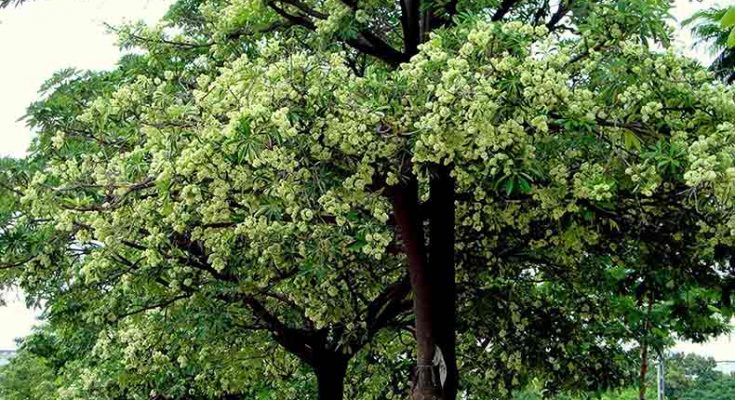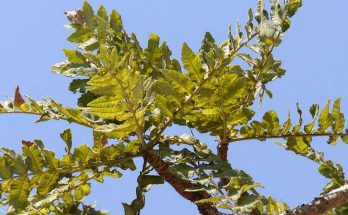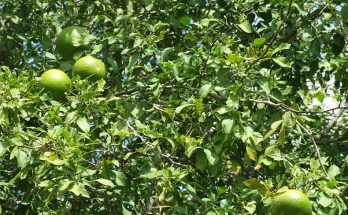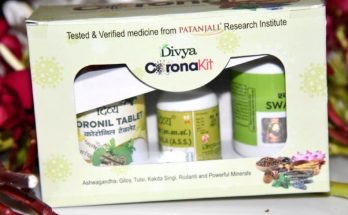Potentiality of Alstonia scholaris is neglected in India. Image Courtesy – Amazon
The potentiality of Alstonia scholaris is neglected in India which has an effective solution to highly infectious H1N1 virus and capability to combat virus replication and building an immuno-response in the lungs. But, its potentiality is cherished by China and they took immense care in researching the herbal plant to produce medicine.
The ‘Atmanirbhar Bharat Abhiyan’ or ‘self-reliant India mission’ has been the vision of Prime Minister of India, Narendra Modi. The Prime Minister of India has announced a financial package of Rs 20 lakh crore under the mission. The government of India has also created a hashtag #AatmaNirbharBharatAbhiyaan for it. But, one thing is clear regarding the health sector that if India wants to become truly ‘self-reliant’ it has to focus on its traditional medicines, especially Ayurveda. India has to explore its potentiality of its herbal medicines through proper scientific research.
Instead of researching on herbal medicines, the government of India is joining hands with foreign pharma companies for life-saving vaccines. On the other hand, China is continuously researching on their traditional medicines and as a result of that, they have been able to control the corona epidemic much before than any country. China is much ahead in the area of medicine development – in fact they are truly ‘self-reliant’.
In a recent study in China, scientists have found immense potentiality in Alstonia scholaris. Scientists in China have been continuously researching on their traditional medicine and they have extended their research on herbal extracts. On the contrary, the government of India is totally dependent on allopathic medicine and allopathic pharmaceutical companies controlled by the western countries.
About Alstonia scholaris
Alstonia scholaris is called by many names like Saitan ka jhad, Chhatim, Blackboard tree, Devil tree, Ditabark, Milkwood-pine, Saptparni, Djetutung, White Pine, Palmira Alstonia, Pine, Milky, Pulai, Jelutong, White Cheesewood, Milky Pine, Australian fever bark tree, Chattun, Chatian, Chhatiwan, Australian quinine bark tree, Bitter-bark tree, Chatiyan Wood, Shaitan, Chatiwan, Tin Pet, Dita, Khaaniqat al-kalab, Shajaratah fi asya al-harrah, Scholarsi etc. It belongs to the Apocynaceae family.
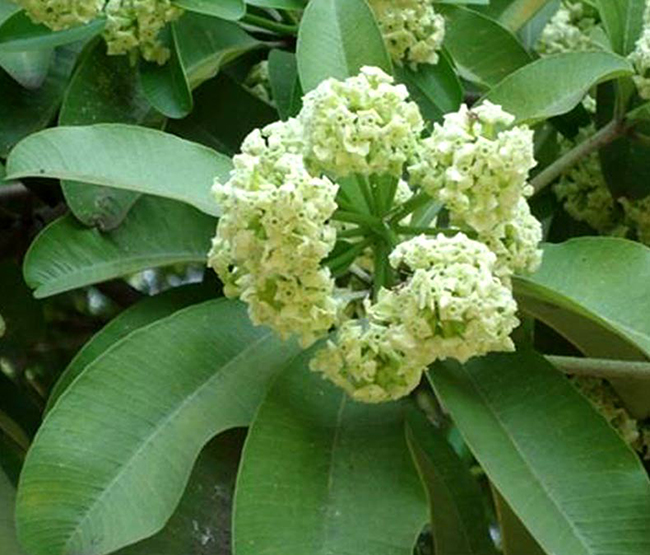
Alstonia scholaris is a native tree to the Indian subcontinent. It can also be found in China, Malaysia, some parts of Indonesia and Australia. Image Courtesy – Podhe
Alstonia scholaris is a native tree to the Indian subcontinent. It can also be found in China, Malaysia, some parts of Indonesia and Australia. Apart from China and India, this tree can also be found in Bangladesh, Myanmar, Vietnam, Sri Lanka, New Guinea and the Philippines.
This large evergreen tree is almost 25-30 meters high. It has a bitter-tasting milk juice. This tree has dark grey bark with twisted branches. The bark of Alstonia scholaris contains alkaloids like ditamine and ditain. The parts used in medicinal purposes are leaves, branches, barks and milky fluid. The flowers of this plant bloom in the month of October and its sweet smell is something similar like Night-blooming jasmine.
Read: Importance and usefulness of Moon Plant to maintain prolonged youthfulness
Traditional Medicines from Alstonia scholaris
Alstonia scholaris is used traditionally for various diseases in China. It cures recurrent and intermittent fever, obesity and cholesterol, jaundice, dandruff and head lice, abscess etc. Some other diseases have been treated in traditional way like diarrhoea, arthritis, indigestion, slimy stools, fatigue, fever, ascaris, phlegm, rheumatism, headache, ulcers, aphrodisiac etc.
Research by the scientists of China
Scientists in China recently published a study on this herbal plant. Alstonia scholaris has been a local and traditional medicine in China used to treat cough, phlegm, asthma, chronic obstructive pulmonary disease etc. Extract of this tree has potentiality and anti-inflammatory effect on influenza virus infection.
The purpose of the research was to analyze the clinical usage of the total alkaloids found in the extract of the tree. Their research was to observe the anti-influenza and anti-inflammatory effects of the extract and how it worked on Influenza A Virus (IAV) infection on mice. The research had been focused on the inhibitory effect of the herbal extract on lung immunopathology caused by influenza A virus infection.
Findings of the scientists
Mice were infected with H1N1 virus intranasally and then treated with the extract of Alstonia scholaris for 5 days in a clinical trial. The analysis was done with bodyweights, survival rates, proinflammatory cytokine levels, viral titer, innate immune cell populations and histopathological changes in the lungs of the mice.
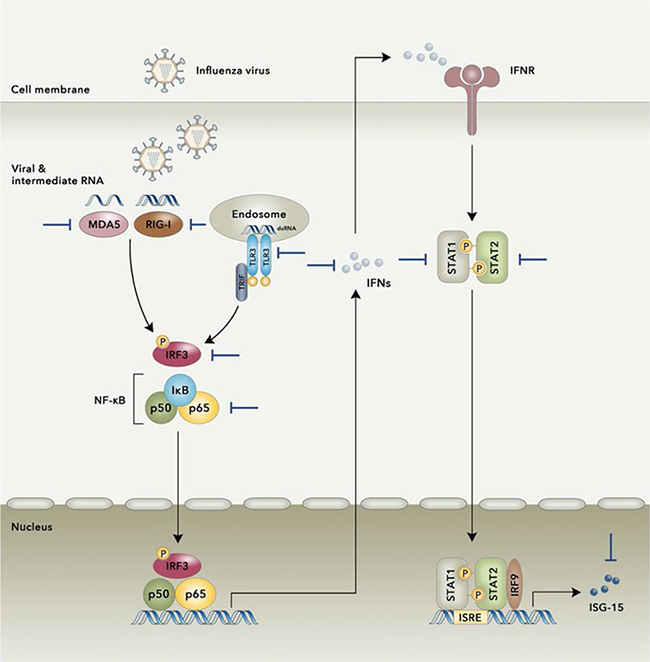
The scientists found a specific correlation between Acute Respiratory Distress Syndrome (ARDS) and marked cytokine activation in the H1N1 pandemic in the year 2009. Image Courtesy – Science Direct
The extract of the herb significantly slowed down viral replication and reduced cytokine and chemokine production at the mRNA and protein levels. The scientists found that the extract increased the survival rate of the mice by suppressing pro-inflammatory cytokine production and improved lung tissues.
Importance of the research
It was being observed that particular leukocytes and high levels of cytokine, chemokine expression help in developing severe human and Avian Influenza A Virus (IAV) infections. The scientists found a specific correlation between Acute Respiratory Distress Syndrome (ARDS) and marked cytokine activation in the H1N1 pandemic in the year 2009.
The scientific research has been supported by the National Key Research and Development Program of China. The project has been funded by the Science and Technology Department in the Macao Special Administrative Region and the Science Research Project of Guangdong Province of China. Chinese scientists have already completed phase I clinical trial of the multiple doses of Total Alkaloids (Alstonia scholaris extract) in healthy Chinese volunteers. They are now undergoing phase II clinical trials in China.
Conclusion
The scientists demonstrated that the extract (total alkaloids) of the Alstonia scholaris tree has anti-influenza and anti-inflammatory effects. They also proved that extract of the tree can be used as an anti-influenza and anti-inflammatory treatment strategy in Influenza A Virus-infected patients.
It may be effective for COVID-19 viral infection, but more research is required for that. India could have found its COVID-19 solution much earlier from the potentiality of Alstonia scholaris extract or other herbal extracts if the proper scientific approach could be done. Many potential herbs are there in India that can help to prepare miracle medicines for deadly infectious viruses like COVID-19. But, proper scientific approach is required.
Reference: Total alkaloids from Alstonia scholaris inhibit influenza a virus replication and lung immunopathology by regulating the innate immune response.

